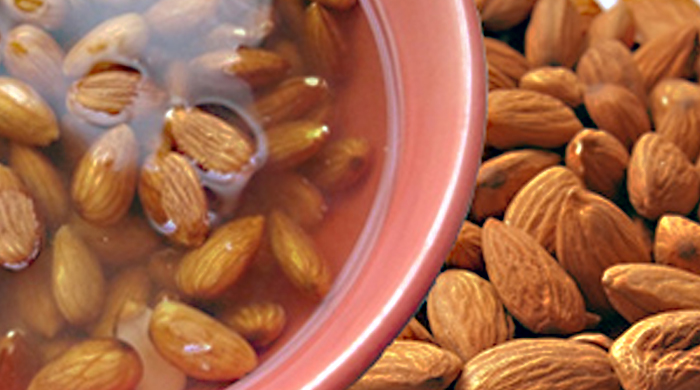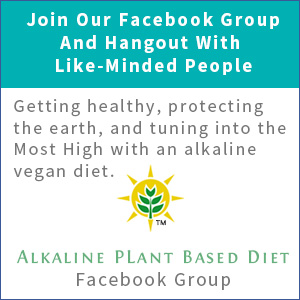Benefits Of Soaking Almonds – Should I Soak Almonds?
Benefits Of Soaking Almonds

As I travel my vegan diet journey I learn a lot and I make modifications to my diet. I have read a lot of information that supports soaking almonds before eating them.
Even though majority of people I speak to support soaking almonds, the information I learned makes me think twice about that decision. It has made me wonder, “Should you soak almonds before eating them?”
Why Do You Soak Almonds?
The general consensus of alternative medicine it soak and sprout nut and seeds to unleash their full nutritional value by activating their enzymes.
I must say I don’t soak almonds all the time, but I do soak them half the time and I have reasons for doing this.
Soaked Almonds Nutritional Value
Activates Almond Enzymes And Improves Digestion
The number one reason to soak almonds is to sprout them and activate their enzymes. Almond skin contains enzyme inhibitors that protects the almond until the proper levels of sunlight and water allow it to germinate.
The belief is that activating the enzymes in the almond allows better digestion and access to its nutrients. To sprout almonds you would soak them overnight.
How To Soak Almonds Overnight?
To sprout almonds you soak almonds overnight for 10 to 12 hours, After 10 to 12 hours you remove the almonds from the water, rinse them, and place them on a wet towel for 12 hours.
After 12 hours you will see white spots at the tip of the almond indicating that it has sprouted. It generally takes between one and three days for the almonds to sprout.
Yes it makes sense to make digesting almonds easier by activating their enzymes. Some people will make blanket statements saying you waste the nutrients is you don’t soak the almonds. I don’t agree with this.
Our bodies have their own enzymes that digest the almonds and break them down into their components.
You might lose some nutritional value if you don’t soak almonds, but that is different than saying their is no nutritional value in eating un-soaked almonds.
Now if we don’t soak the almonds and remove the skin, the phytates in the skin can interfere with digestion. The concern is phytates can bind with iron and zinc and reduce their absorption into the blood.
The reality is this concern is overblown and misinformation stops many people from repeating the benefits of phytates. The studies that supported the anti-nutrient ability of almonds involved people who basically lived off grains and had a nutrient deficient diet.
Yes, this was problematic because the lack of nutrients in their diets made the high amount of phytates they consumed from grains problematic.
We shouldn’t overlook phytates because they kill cancer through all of their pathways, and make cancer cells act like normal cells.[1] Phytates also protect against osteoporosis, [2] and possess anti-inflammatory properties.
In the defense of soaking almonds, it does make almonds softer and easier to chew.
What They Don’t Tell You About Raw Almonds
If you eat processed or roasted almonds, the process kills the enzymes. To avoid this people eat raw almonds. The problem still remains because we buy pasteurized raw almonds and the pasteurization process also kills enzymes.
U.S. law requires the pasteurization of all almonds grown in the U.S.
The USDA allows pasteurized almonds to be labeled raw even though they no longer are.
Farmers can sell unpasteurized almonds but not to food distributors or markets so you have to get them from roadside merchants.
Benefits Of Not Soaking Almonds And Removing Skins
We are able to digest almonds with their skins, and benefit from their nutrients. The almond skin is insoluble fiber that doesn’t get digested. Instead it travels to colon where it feeds the good bacteria that supports the immune system.
Almond skins contain a combination of antioxidants and vitamin E, which work protect cells from free radical damage. Research suggests that there combination also work together to prevent LDL cholesterol oxidation, which contributes heart disease.
What Does This Mean For The Almonds I Eat?
I basically soak almonds half the time I eat them. They taste a little different both ways and since I like how they taste both ways, I eat them both ways.
I also eat a lot of almonds so soaking half the almonds and removing their skin will reduce some of my phytate intake. It also gives me the opportunity to see them sprout, and give my digestive tract a break from to process a ton of insoluble fiber.
Eating the other half of the almonds un-soaked, I gain the benefits of the nutrients in the the almond skin and the insoluble, which will help clean my digestive tract and feed the good bacteria in my colon. I guess a just found a balance.
[1] A. M. Shamsuddin. Anti-cancer function of phytic acid. Int J Food Sci Tech 2002 37(7):769 – 782.
[2] Consuming Phytates Helps Strengthen Bones And Reduce Osteoporosis Risk
Cornell -Tannins
Tags: almonds, benefits, benefits of soaking almonds, should I soak almonds, soak almonds, soaked, soaking almonds







